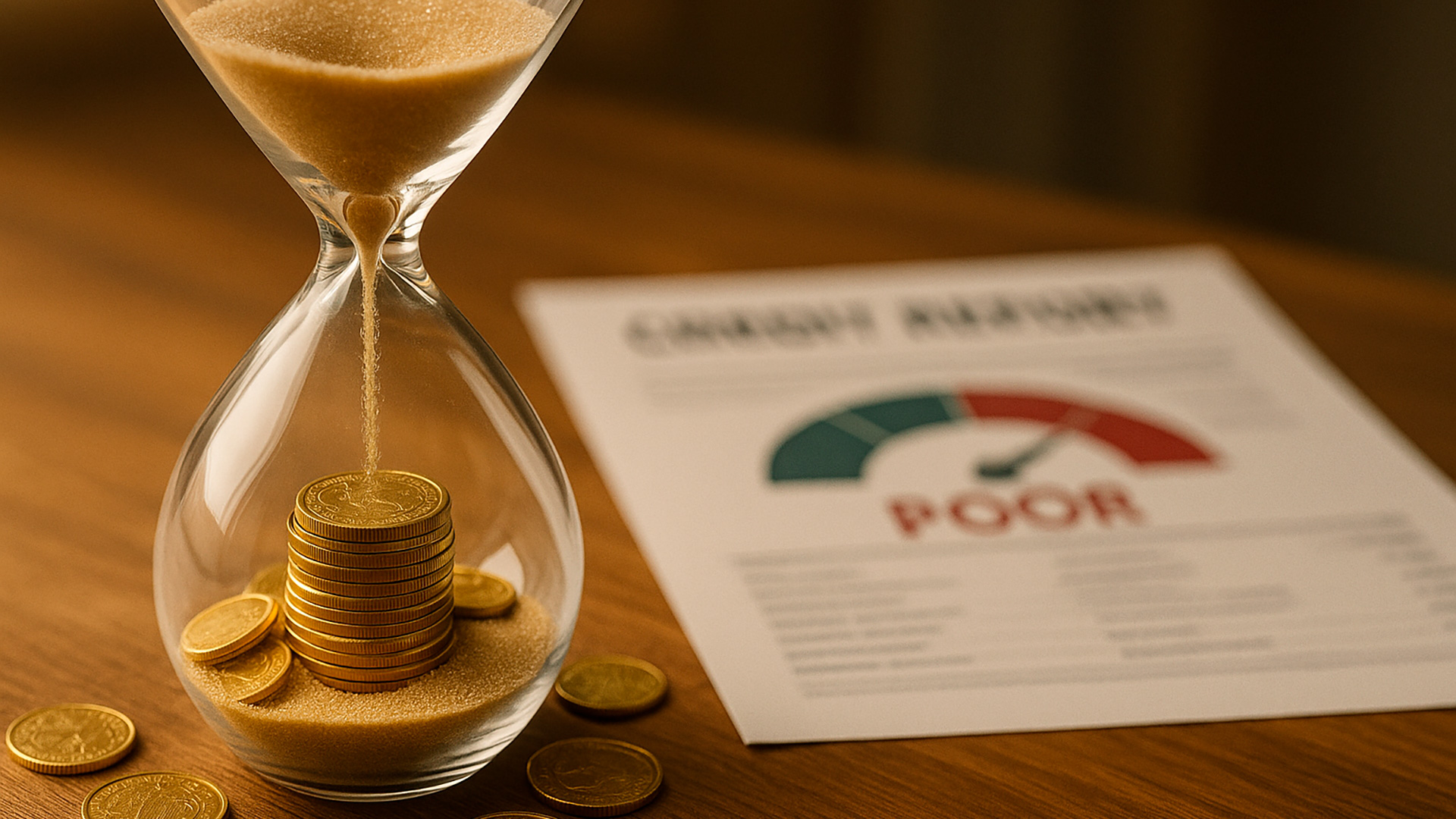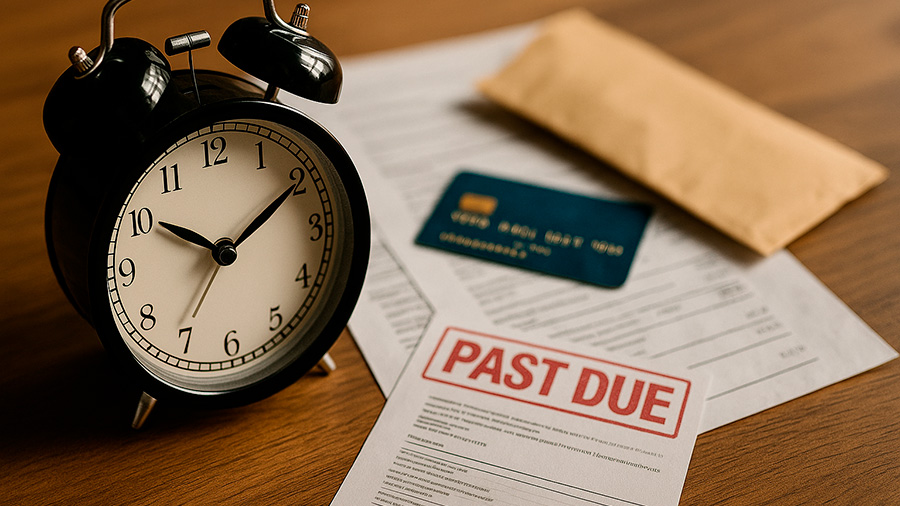
Paying bills on time seems like a small act, but it’s one of the most powerful habits for keeping your financial life healthy. Many people assume that being a few days late on a loan or credit card payment is harmless — but that’s not always true. While a slight delay may not immediately show up on your credit report, repeated or extended lateness can have serious consequences. Knowing how many days late before it impacts your credit score can help you avoid costly mistakes and take control of your financial reputation. In this guide, we’ll explore how credit reporting works, what lenders see, how late payments are categorized, and how to recover if you’ve missed a due date.
What Happens When a Payment Is Late
Most lenders and credit card companies have a grace period — usually a few days — after the due date before reporting a payment as delinquent. For example, if your payment is due on the 15th and you make it on the 18th, you’ll likely face a late fee, but it won’t yet affect your credit score. However, once the delay extends beyond a certain number of days, the lender can report it to the credit bureaus (Experian, Equifax, and TransUnion). At that point, your score begins to suffer. Understanding how many days late before it impacts your credit score is the key to preventing minor slip-ups from turning into long-term damage.
The Credit Reporting Threshold: 30 Days Late
Credit bureaus do not record payments that are only a few days overdue. The official threshold begins at 30 days. If you’re 30 or more days past the due date, the lender may report the delinquency to the credit bureaus. This report will stay on your credit file for up to seven years, even after the balance is paid. The first 30-day mark is therefore the most critical. Payments that are one to 29 days late affect your wallet through fees and interest, but not your credit score — yet.
Once you cross that 30-day mark, the payment becomes officially “delinquent.” Your credit score can drop anywhere from 50 to 110 points, depending on your previous history and the severity of other factors. The cleaner your record, the more significant the drop. Ironically, those with excellent credit scores tend to see the biggest hit from a single missed payment. Knowing how many days late before it impacts your credit score can help you act quickly within that grace period to avoid lasting consequences.
Table: The Late Payment Timeline and Consequences
| Days Late | Status | Impact on Credit | Other Consequences |
|---|---|---|---|
| 1–14 days | Minor Delay | No impact | Possible late fee; interest may accrue |
| 15–29 days | Past Due | No impact | Late fees; potential suspension of rewards or account benefits |
| 30–59 days | Delinquent | Reported to bureaus; score drops 50–110 points | Credit card interest rate may increase (penalty APR) |
| 60–89 days | Serious Delinquency | Further score decline; account flagged for collection | Higher risk of account restriction |
| 90+ days | Default Risk | Severe score damage; potential collection or charge-off | Possible legal action or account closure |
How Late Payments Affect Different Types of Accounts
The rules for how many days late before it impacts your credit score vary slightly depending on the type of account. Credit cards, auto loans, student loans, and mortgages are all reported differently. Here’s how the process works for the most common types of credit:
- Credit cards: Issuers often report to bureaus as soon as a payment is 30 days late. They may also apply a penalty APR, increasing your interest rate significantly.
- Auto loans: Lenders typically allow a grace period of 10–15 days, but once a payment hits 30 days overdue, it’s reported as delinquent.
- Mortgages: Mortgage servicers are required to notify credit bureaus of missed payments at the 30-day mark. Multiple missed mortgage payments can trigger foreclosure proceedings.
- Student loans: Federal loans usually aren’t reported as delinquent until they’re 90 days late, giving borrowers more time to catch up.
Each type of loan has its own rules, but the general 30-day standard remains the industry norm. Missing multiple payments across different types of credit can magnify the damage quickly, showing lenders a pattern of instability.
Real Example: The Cost of a Single Missed Payment
Let’s take the case of Kevin, who had a 780 credit score and accidentally missed a $200 credit card payment by 35 days. His score dropped to 710 after the delinquency was reported. Although Kevin paid the balance and late fee immediately, the record remained on his credit report for seven years. Even though his score recovered within a year, the missed payment temporarily affected his ability to get the best interest rate on an auto loan. His story underscores the importance of understanding how many days late before it impacts your credit score — and how one oversight can create ripple effects across your financial life.
Why Credit Scores React So Strongly to Payment History
Payment history accounts for 35% of your FICO credit score — the single largest factor in determining your creditworthiness. This means every on-time payment builds your score, while every late payment chips away at it. Credit models assume that past behavior predicts future risk. So, a borrower who pays late once might pay late again. Even if it’s an honest mistake, the system treats it as a sign of unreliability. That’s why it’s crucial to set reminders, automate payments, or use mobile alerts to avoid crossing the 30-day threshold. Once you know how many days late before it impacts your credit score, you can use that window wisely to protect your rating.
Table: FICO Credit Factors and Their Weight
| Category | Weight in Score | Example of Impact |
|---|---|---|
| Payment History | 35% | Missing one 30-day payment can drop score 80–100 points |
| Credit Utilization | 30% | Using more than 30% of your available credit lowers score |
| Length of Credit History | 15% | Longer accounts improve stability |
| Credit Mix | 10% | Diverse loans and cards strengthen profile |
| New Credit | 10% | Too many new inquiries signal risk |
What to Do If You’re Already Late
If you’ve missed a payment but haven’t hit the 30-day mark yet, act immediately. Most lenders allow you to make a late payment without reporting it if you settle the balance quickly. Call your creditor, explain the situation, and request a waiver of the late fee if it’s your first offense. Once you’ve passed 30 days, pay as soon as possible. The longer the payment remains unpaid, the worse the damage. A 60- or 90-day delinquency hurts far more than a single 30-day event. Many creditors will remove a one-time late mark if you’ve been a long-term reliable customer — a practice known as a goodwill adjustment. Knowing how many days late before it impacts your credit score allows you to take immediate corrective action and minimize harm.

Preventing Late Payments in the Future
It’s easier to prevent credit damage than to fix it. Here are simple, effective habits to keep your payments on track:
- Set up autopay: Link your checking account to make automatic minimum payments each month.
- Use calendar reminders: Digital reminders help you plan ahead, especially for loans with irregular due dates.
- Monitor your accounts weekly: Regular check-ins help you spot issues before they escalate.
- Keep a small emergency buffer: A separate savings account can cover payments during tight months.
- Consolidate due dates: Align all payments to one or two dates per month for simplicity.
These small changes prevent missed deadlines and the stress that comes with them. Once you understand how many days late before it impacts your credit score, these habits will become second nature.
Real Example: From Delinquency to Recovery
After losing her job, Amanda fell 60 days behind on her personal loan and two credit cards. Her score plummeted from 720 to 590. She contacted her lenders to set up payment plans and made consistent payments for six months. One lender agreed to remove the late mark after full repayment. Within a year, her score climbed back to 660. Amanda’s case illustrates that while late payments hurt, recovery is possible through consistent effort and open communication.
How Long Late Payments Stay on Your Credit Report
Even after you catch up, late payments remain visible for up to seven years from the original delinquency date. However, their impact lessens over time. Recent delinquencies weigh more heavily than older ones. After two years of consistent on-time payments, most scoring models view your past mistakes with less severity. Maintaining good financial habits not only restores your score but also builds resilience against future challenges. Once you know how many days late before it impacts your credit score, time becomes your ally in recovery.
Technology That Helps You Stay on Track
Modern apps and banking tools make managing payments easier than ever. Platforms like Mint, Credit Karma, and Experian Boost send real-time alerts when payments are due or accounts fall behind. Some credit cards even allow customers to choose their own due dates or change them monthly. Automation has become a powerful ally for consumers who want to maintain perfect records. By using these tools, you can eliminate human error — the number one cause of accidental late payments — and protect your financial profile.
Long-Term Effects on Your Financial Life
Missed payments don’t just affect your credit score; they influence your ability to borrow, rent, or even get certain jobs. Lenders see late payments as indicators of risk, landlords use them to screen tenants, and employers in financial industries may check credit reports before hiring. The domino effect can be wide-reaching. A single delinquency might increase your loan interest rates or insurance premiums for years. That’s why understanding how many days late before it impacts your credit score is about more than numbers — it’s about protecting your financial opportunities and peace of mind.
